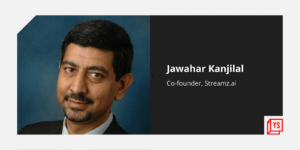
The often-quoted adage goes ‘it takes a village to raise a child. Likewise, behind every successful startup are other game changers that not everyone gets to hear about. Day Two at TechSparks saw the coming together of three such ‘game changers’ who, through their work, have empowered transformation at massive scale for businesses. These included Alok Patnia, Founder and Managing Partner, TMG. (Taxmantra Global); Atul Mehta, COO, Shiprocket; and Vargab Bakshi, Vice President, Wix.com.
The biggest game changers for the techade
All panellists called out that startups were going to be the biggest game changers for India in the techade. “India is a 1.5 billion-strong nation with about 43% of her population on the internet right now,” said Bakshi. adding that he believed that about 80% of the country will be on the internet over the next 10 years.
“This means that there will be more startups solving for this number. India’s always going to be the country that gives product companies a lot of user volume; it’s what most companies come here for,” he added.
“India is at the 3.7 trillion mark and the $10 trillion economy could well be a reality soon.” said Patnia who believes that entrepreneurs will play a key role in reaching the $10 trillion mark.
“I believe startups leveraging emerging technologies like AI, ML, and IoT will create solutions in areas like agriculture, like healthcare, education. [These] solutions will be scalable, sustainable, and the biggest game changers for the techade,” he added.
Mehta borrowed a cricket analogy as he discussed how the Indian startup ecosystem will evolve in the techade.
“More than just the ‘Virat Kohlis’, the startup ecosystem is going to see a lot of great ‘Ranji’ players,” he said, contextualising how he meant that smaller businesses were going to increasingly form a bigger slice of the pie.
Technology innovation in the country is really going to power MSMEs and that’s going to be our strength. “India has quantity; this quantity is going to pay big dividends There is going to be a lot of MSME innovation. Yes, they will be the big startups who will drive it,” he said.
Creating an expansion playbook
Creating solutions from India for the world is an important component of the Great Indian Techade, and Patnia, who works in the realm of cross-border corporate services for businesses and investors across the globe with TMG, offered his perspective on creating an expansion playbook.
“In today’s world, I see a lot of interest not only from Indian startups to go global, but also global startups who come to India. When it comes to scaling across geographies, it’s very important that businesses understand the laws of the land, its nuances, frame their business model compliantly for long-term success…it’s often best that they have a partner in this journey who is experienced in navigating complex global regulatory ecosystem strategically,” he said.
It’s important to create systems and processes from day one. “A true game changer would be successfully implementing a disruptive model within a new legal, social, and ethical framework,” he added.
Patnia said India is more ready than ever before to help global and local businesses expand in the country. “GST itself has subsumed around 18 laws in one go. We, as a nation, are inviting a lot of investments,” he said.
“We (TMG) have helped close to 18 large global players come to India and set up their businesses quite successfully too,” he added. “
Logistics and ecommerce shaping the Great Indian Techade
Mehta, the strategist behind India’s largest eeommerce enablement platform, has been key in expanding the government’s ONDC initiative and leading innovation in last-mile deliveries across the country. He believes that the system is truly going to be a game changer for both buyers and sellers in the techade.
“ONDC is driving simplicity and inclusion and that is a powerful driver for adoption,” he said.
Websites of the future
With an increasing amount of users coming online, Bakshi, the man who helped millions of Indian businesses go online through his work at Wix and Shopify, gave the audience a peek into what websites of the future will look like.
“Websites in the future will definitely be more interactive, and have more immersive and personalised user experiences. I also expect virtual reality to play a bigger role as you browse through websites,” he said, adding that it could be very Tony Stark-ish.
In the next three years, 5G is will dominate. “That means better data. Better data allows companies to provide better technology solutions, services, and more immersive experiences,” he added.
Bakshi also spoke about how Wix is leveraging generative AI to help users website building through simple prompts.
“The metaverse also is also going to play a part where things online can move offline and things move to things offline can move off online. I believe that experience will also grow over the next decade,” he said.
Fitting disruptive models in today’s legal framework
The panel also discussed the challenges of scaling in an extremely dynamic and evolving landscape and legal framework, particularly given the context of the impending Digital Personal Data Protection Bill.
“I see India’s data bill playing a huge role in how data is stored, not just for customers, but also for businesses,” Bakshi said.
“Governments have become very particular now about where transaction data is stored in the context of geopolitical issues. And the evolving data data threat landscape,” he said, discussing how data frameworks were going to be even more complex in the near future, especially for companies operating across borders.
Citing several examples from working with Swiggy in their early days with pre-GST challenges to more recently working with a Web3 startup with a disruptive product, Patnia spoke about how they help clients consolidate the landscape from different legal aspects (in terms of different countries and creating a common ground for due diligence).
“We work with entrepreneurs who are always coming up with disruptive business models, and it’s our job to help them best fit their disruptive model in today’s legal framework, regardless of whether it’s implementing tokenomics, doing an ICO, or simply expanding a startup across geographies,” he said.




![Read more about the article [Funding alert] Robotics firm Miko raises Rs 50 Cr from IvyCap, others](https://blog.digitalsevaa.com/wp-content/uploads/2021/04/Co-founders_Miko1565755699084-300x150.jpg)





